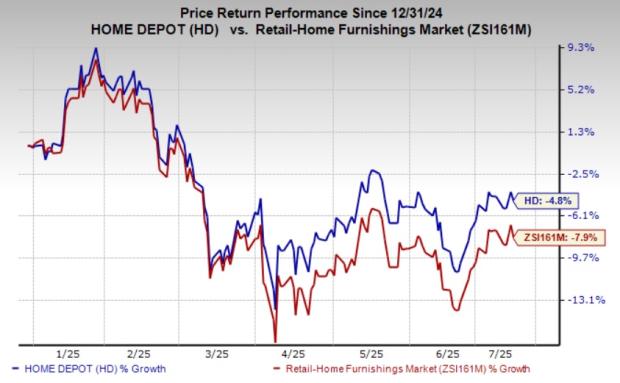Can Home Depot's Technology Investments Fix Sluggish DIY Sales Trends?
At The Home Depot Inc. HD, do-it-yourself (DIY) projects are central to the business, involving home improvement tasks that customers undertake without professional assistance. These range from small jobs like painting and gardening to more complex upgrades like flooring or minor kitchen remodels. Larger projects, like bathroom or kitchen remodels, often depend on financing, making them more sensitive to interest rates and economic conditions.
Home Depot’s first-quarter fiscal 2025 results showed signs of resilience, but DIY demand remains sluggish amid a high-rate environment that continues to dampen large remodeling projects. While customers stayed engaged with smaller tasks and spring promotions, the bigger-ticket renovations, often financed, are still on hold, limiting stronger sales momentum.
To counter this, HD is leaning heavily into tech. The company is rolling out AI tools like "Magic Apron" to bring store-level expertise online and launching generative AI support for associates to improve product knowledge in real time. Additionally, tools like the Pocket Guide and localized certifications aim to boost associate engagement and customer satisfaction in stores.
Beyond DIY, Home Depot’s focus on its Pro ecosystem, including enhanced trade credit, better delivery speed and order management, shows promise. Pro sales outpaced DIY in the fiscal first quarter, and SRS, now managing trade credit, is already delivering results. While tech investments alone may not ignite a DIY boom, these are strengthening Home Depot’s foundation, ensuring it is ready to capture market share when the deferred $50 billion in home improvement demand finally unlocks.
Rivals Challenging Home Depot in the DIY Space: LOW & FND
In the DIY space, Home Depot faces strong competition from Lowe’s Companies Inc. LOW, its closest rival with a similar customer base and nationwide footprint. Floor & Decor FND is also a growing competitor, particularly in flooring and hard surface categories, wherein it appeals to value-conscious DIYers with a focused, warehouse-style format and project-specific expertise.
Lowe’s DIY business remains under pressure from weak big-ticket demand, but the company is driving engagement through tech tools like the AI-powered Mylow and its more than $30 million-member loyalty program. Seasonal events, affordable product innovations and data-driven marketing aim to lift DIY sales. With a strategy that closely mirrors Home Depot’s, Lowe’s is focused on improving experience and value to stay competitive in a soft but critical segment.
Floor & Decor’s DIY business remains a strong growth engine, driven by its focus on value pricing, in-store design services, and a wide selection of hard-surface flooring. The company caters to project-minded homeowners with easy-to-navigate stores and knowledgeable staff. Its DIY appeal overlaps with Home Depot’s flooring segment, but FND’s specialty focus and curated assortments give it an edge in experience and execution for flooring-specific home improvement projects.
The Zacks Rundown for Home Depot
HD shares have lost 4.8% year to date compared with the industry’s decline of 7.9%.

From a valuation standpoint, Home Depot trades at a forward price-to-earnings ratio of 23.65X, significantly higher than the industry’s 20.89X. It has a VGM Score of B.
The Zacks Consensus Estimate for HD’s fiscal 2025 earnings implies a year-over-year decline of 1.3%, whereas its fiscal 2026 earnings estimate indicates year-over-year growth of 9.1%. Earnings estimates for fiscal 2025 and 2026 have been unchanged in the past 30 days.
Home Depot currently carries a Zacks Rank #3 (Hold). You can see the complete list of today’s Zacks #1 Rank (Strong Buy) stocks here.
This article originally published on Zacks Investment Research (zacks.com).
Zacks Investment Research